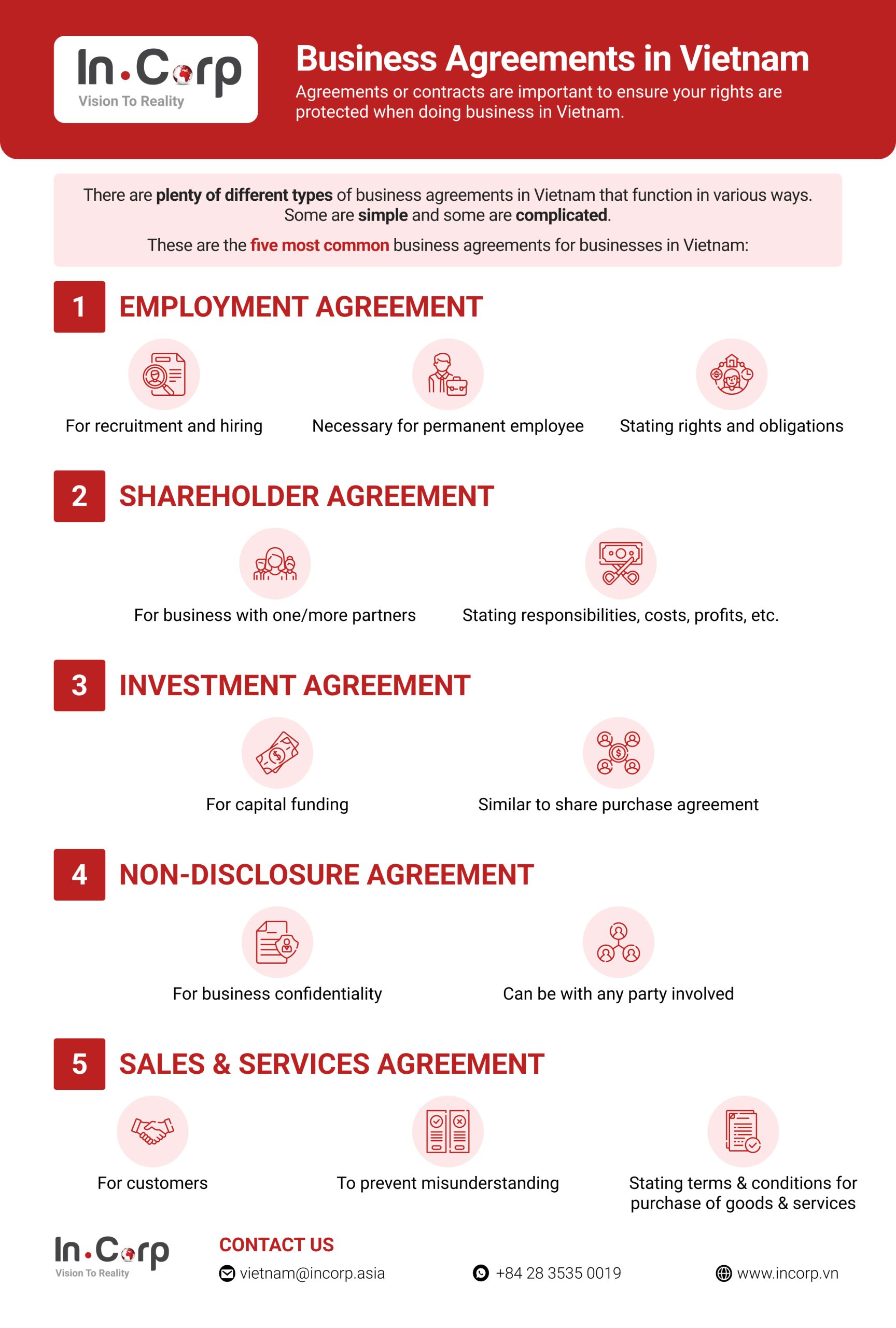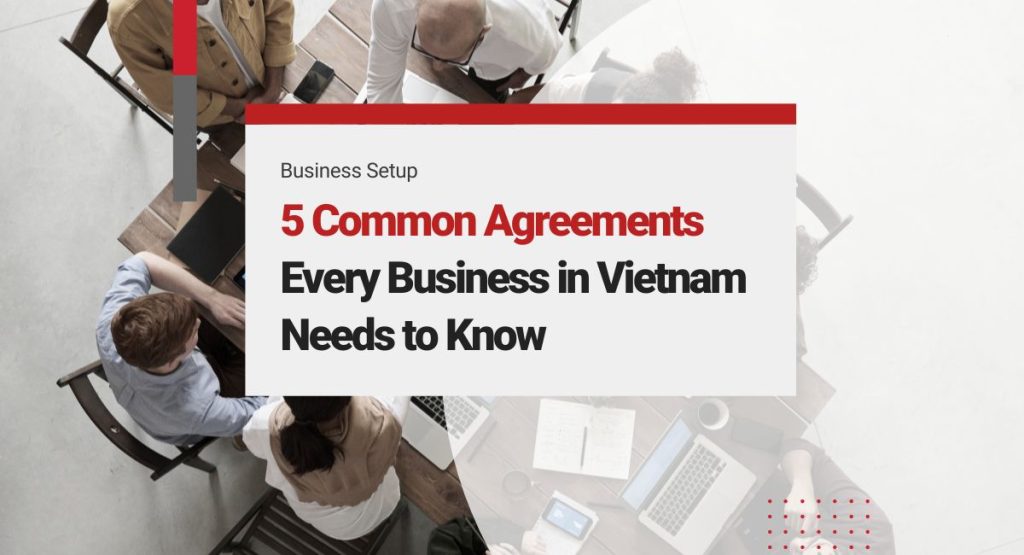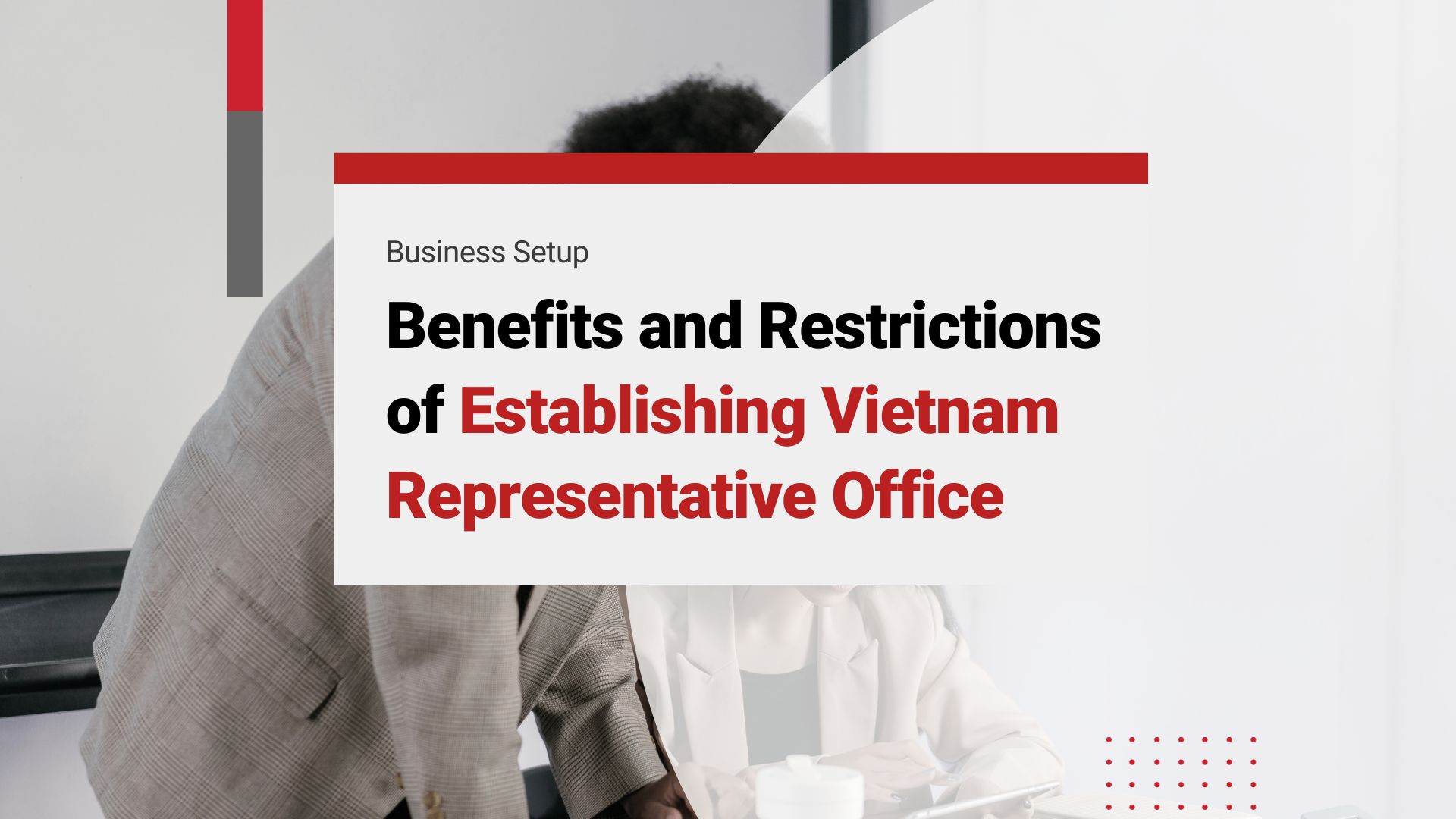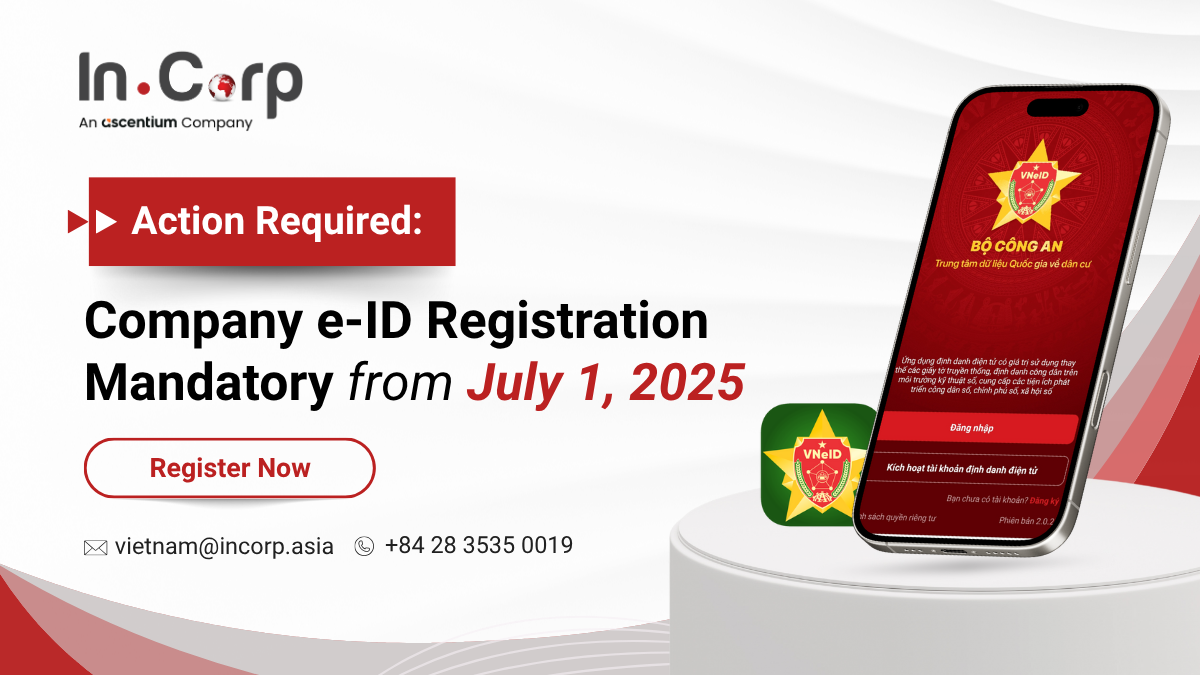In the multifaceted landscape of business transactions and activities in Vietnam, safeguarding the rights of investors is paramount. Vietnam’s business environment is a complex web of diverse dealings, each with its unique characteristics. In this context, common agreements and contracts play a pivotal role in establishing legal frameworks to uphold the interests and responsibilities of all involved parties. In this article, we aim to elucidate five common agreements in Vietnam that every aspiring investor should acquaint themselves with. Additionally, we delve into the risks associated with contract violations, equipping you with the knowledge necessary to mitigate these risks and circumvent unnecessary disputes when conducting business in Vietnam.
Investing in Vietnam? Check out InCorp’s Incorporation Services in Vietnam
An agreement, often referred to as a contract, is a legally binding document that serves to formalize the understanding, obligations, and duties among the parties involved. It meticulously outlines the specific requirements and expectations that each party must adhere to. Amidst the hustle and bustle of foreign investors navigating the Vietnamese business landscape, which demands attention to markets, operations, employment, finances, profitability, and budgets, the significance of well-drafted legal agreements is more often than not overlooked.
Engaging in business transactions or partnerships without the solidity of a legally sound agreement can potentially pave the way for future legal entanglements, posing substantial risks to a company’s stability and success.
Read more: Doing Business in Vietnam as a Foreign Investor: What, Where, Why and How?
Doing Business in Vietnam with Common Agreements

Vietnam’s business landscape encompasses a diverse array of agreements, each tailored to serve distinct purposes and complexities. While some agreements are straightforward, some are intricate. The five most prevalent business agreements in Vietnam are listed below.
Employment Agreement
An employment contract is a fundamental document that plays a pivotal role in the recruitment and engagement of employees, particularly those in long-term positions exceeding three months. This contract serves as a comprehensive blueprint, outlining the respective rights and responsibilities of both employer and employee throughout the course of employment.
The Vietnamese Labour Law i.e., the Labour Code 2019, defines an Employment Contract in a similar fashion as the previous Labour Code of 2012. Essentially, it is an agreement reached between an employee and an employer, pertaining to a position with associated wages or salaries, along with the working conditions and the corresponding rights and obligations for each participant within the labor relationship. It’s important to note that even if the agreement employs different terminology, as long as it encompasses elements like compensation, managerial authority, instruction, and supervision by one of the involved parties, it will be regarded as an employment contract under the Labour Code 2019.
Nominee Agreement
A nominee agreement in Vietnam constitutes a vital arrangement between two parties. One party, typically a Vietnamese individual or legal entity, consents to represent and take on roles such as director, shareholder, secretary, or company promoter for a company, owned by another party. The other party in such a case will be a foreign individual or legal entity, in a foreign country outside Vietnam. This unique agreement serves as a common solution for foreign investors seeking opportunities in Vietnam, and here’s why:
- The nominee agreement streamlines the often intricate investment procedures in Vietnam. Establishing a company in Vietnam through a Vietnamese investor is generally a smoother process compared to foreign investors navigating the same terrain.
- Unlike foreign investors, Vietnamese investors aren’t obligated to provide extensive proof of financial capacity for capital contribution. Accordingly, the nominee agreement is a common recourse for foreign investors seeking to invest in Vietnam.
- Vietnam imposes certain restrictions on foreign investors entering conditional businesses. A nominee agreement makes it easier to navigate these restrictions.
- The Audit Law mandates audited financial statements for companies with foreign-owned capital, in Vietnam. In contrast, Vietnamese companies aren’t subjected to this requirement. Having a nominee agreement in place can lead to reduced audit fees for foreign investors.
- Under a nominee agreement, foreign investors can also generate substantial profits, by leveraging local staff with competitive salary packages.
Shareholder Agreement
In Vietnam, when business ventures involve one or more partners, the shareholder agreement stands as a pivotal document. This agreement outlines the dynamics of shared responsibilities, costs, profits, and losses among partners, providing a clear framework for cooperation. Essentially, a shareholder agreement is a pact among a company’s shareholders, addressing various company-related matters and safeguarding shareholder interests.
This crucial agreement can be established either before or after the formation of the enterprise. In cases post-establishment, it introduces additional and more specific provisions, thereby enhancing the collective interests of participating shareholders and contributing to the efficient governance of the corporation. A well-crafted shareholder agreement serves as a vital tool for dispute resolution in instances where internal conflicts arise. A shareholder agreement delves into various pivotal aspects underpinning a company’s governance and operations. These elements include:
- This agreement meticulously outlines the voting rights of shareholders, aligning with the stipulations of the Enterprise Law.
- Under the Enterprise Law, shareholders typically possess the right to freely transfer their shares, subject to specific legal conditions. However, to fortify commitment to the company, a shareholder agreement may impose limitations on share transfers for a prescribed duration. These constraints can serve the purpose of averting public disclosure or preserving the company’s control.
- In cases where external investors exert control over the company, founding shareholders may consent to granting priority to existing shareholders for share sales. However, the Enterprise Law does not impose a ceiling on the number of shares in this context. Importantly, it’s vital for investors to recognize that restricting share transfers in this manner contravenes the provisions of the Enterprise Law and the company’s operating charter, making its practical application legally untenable.
Investment Agreement
The Investment Agreement mirrors a Share Purchase Agreement in many aspects. It serves as a guiding document for the intricate relationship between investors and the company, in the context of capital funding. This legally binding agreement charts the course of capital infusion into the business, safeguarding the interests of all parties involved.
Non-disclosure Agreement
In commerce, preserving business integrity and safeguarding trade secrets are paramount concerns for all enterprises. This is where a Non-Disclosure Agreement (NDA) comes into the picture. It is a crucial legal instrument for when a company needs to safeguard its sensitive information.
A Non-Disclosure Agreement, often abbreviated as NDA, is a binding contract entered into between two or more parties. Through the covenants of this agreement, the involved parties are legally bound to maintain the confidentiality of specific information. This information, often of a sensitive or proprietary nature, is to be shielded from disclosure to third parties except for expressly defined, limited purposes.
The NDA takes on various monikers, including Confidentiality Agreement, Confidential Disclosure Agreement, Proprietary Information Agreement, and Security Agreement. Despite these diverse names, the core function remains consistent. It preserves the confidentiality of critical business data. For companies, their intellectual property, trade secrets, and sensitive data are valuable assets. An NDA serves as a robust shield, preventing unauthorized access or disclosure.
International Sales and Services Agreement
In the realm of international commerce, the International Sales and Services Agreement plays a pivotal role. It’s a global-scale contract governing goods and services exchange between companies and customers. This agreement outlines the terms, rights, and responsibilities of both buyers and sellers in the context of a transnational trade.
The CISG relies on parties from different states to define internationality, with Vietnam as a member. Vietnam’s Commercial Law of 2005 doesn’t explicitly define international sale contracts but lists qualifying activities, including cross-border trade.
Therefore, as per Article 27 of the Vietnam Commercial Law 2005, the concept of international sale and purchase of goods encompasses a range of activities. These include exports, imports, temporary imports for re-export, temporary exports for re-import, and transfers through border-gates.
The essence of an international sale and purchase contract for goods lies in its embodiment of the voluntary intent of the parties. It serves as the formalization of their mutual rights and responsibilities, bearing legal recognition. Hence, foreign businesses must exercise due diligence in addressing critical aspects of these contracts.
These crucial components encompass various facets, including payment terms (covering methods, schedules, and required documentation), delivery conditions, and legal provisions (entailing penalties, dispute resolution mechanisms, and the choice of applicable laws). Careful attention to these elements from contract start to finish helps foreign enterprises reduce potential business risks.
Risks of Contract Violation in Vietnam
Breach consequences highlight the need for legally binding agreements to ensure commitment fulfillment and prevent contract violations. In Vietnam, common agreements in contract law may lead the injured party to seek compensation. This happens when one of the parties fails to meet their obligations, resulting in harm to another party or parties. The matter may also be adjudicated in court, with enforcement of compensation determined by legal authorities. Comprehensive contracts are crucial in protecting the interests of all parties in Vietnamese business transactions.
Conclusion
In Vietnam, international business hinges on understanding essential agreements that underpin successful operations. Often underestimated amidst the entrepreneurial frenzy, these agreements are vital for protecting the rights and duties of all stakeholders.
Recognizing these vital agreements and following their terms helps foreign enterprises navigate Vietnam’s business landscape efficiently. These agreements are not mere formalities. They are essential tools for mitigating risks, resolving disputes, and fostering a stable and prosperous business environment in Vietnam.
How InCorp Can Assist in Drafting Agreements
Business owners must actively engage in contracts and agreements in their day-to-day operations when conducting business in Vietnam.
InCorp Vietnam’s team comprises highly experienced legal consultants well-versed in Vietnamese regulations and laws. They protect your rights as a business owner in any contracts or agreements drafted.
InCorp offers assistance in drafting various agreements, including employment agreements, partnership agreements, non-disclosure agreements, joint venture agreements, memorandum of understanding, and memorandum of association. We meticulously evaluate the entire drafting process and provide recommendations.

clients worldwide

professional staff

incorporated entities in 10 years

compliance transactions yearly







